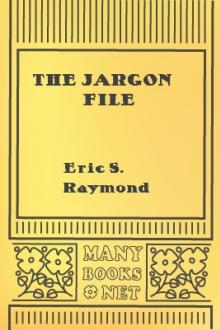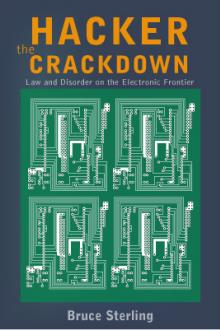The Jargon File by Eric S. Raymond (ebook reader android txt) 📕

- Author: Eric S. Raymond
- Performer: -
Book online «The Jargon File by Eric S. Raymond (ebook reader android txt) 📕». Author Eric S. Raymond
Node:You are not expected to understand this, Next:[15055]You know
you've been hacking too long when, Previous:[15056]YMMV, Up:[15057]= Y
=
You are not expected to understand this [Unix] cav.
The canonical comment describing something [15058]magic or too
complicated to bother explaining properly. From an infamous comment in
the context-switching code of the V6 Unix kernel. Dennis Ritchie has
[15059]explained this in detail.
Node:You know you've been hacking too long when, Next:[15060]Your
mileage may vary, Previous:[15061]You are not expected to understand
this, Up:[15062]= Y =
You know you've been hacking too long when
The set-up line for a genre of one-liners told by hackers about
themselves. These include the following:
not only do you check your email more often than your paper mail,but you remember your [15063]network address faster than your
postal one.
your [15064]SO kisses you on the neck and the first thing youthink is "Uh, oh, [15065]priority interrupt."
you go to balance your checkbook and discover that you're doing itin octal.
your computers have a higher street value than your car.
in your universe, `round numbers' are powers of 2, not 10.
more than once, you have woken up recalling a dream in some
programming language.
you realize you have never seen half of your best friends.A [15066]list list of these can be found by searching for this phrase
on the web.
[An early version of this entry said "All but one of these have been
reliably reported as hacker traits (some of them quite often). Even
hackers may have trouble spotting the ringer." The ringer was
balancing one's checkbook in octal, which I made up out of whole
cloth. Although more respondents picked that one out as fiction than
any of the others, I also received multiple independent reports of its
actually happening, most famously to Grace Hopper while she was
working with BINAC in 1949. --ESR]
Node:Your mileage may vary, Next:[15067]Yow!, Previous:[15068]You know
you've been hacking too long when, Up:[15069]= Y =
Your mileage may vary cav.
[from the standard disclaimer attached to EPA mileage ratings by
American car manufacturers] 1. A ritual warning often found in Unix
freeware distributions. Translates roughly as "Hey, I tried to write
this portably, but who knows what'll happen on your system?" 2. More
generally, a qualifier attached to advice. "I find that sending
flowers works well, but your mileage may vary."
Node:Yow!, Next:[15070]yoyo mode, Previous:[15071]Your mileage may
vary, Up:[15072]= Y =
Yow! /yow/ interj.
[from "Zippy the Pinhead" comix] A favored hacker expression of
humorous surprise or emphasis. "Yow! Check out what happens when you
twiddle the foo option on this display hack!" Compare [15073]gurfle.
Node:yoyo mode, Next:[15074]Yu-Shiang Whole Fish,
Previous:[15075]Yow!, Up:[15076]= Y =
yoyo mode n.
The state in which the system is said to be when it rapidly alternates
several times between being up and being down. Interestingly (and
perhaps not by coincidence), many hardware vendors give out free yoyos
at Usenix exhibits.
Sun Microsystems gave out logoized yoyos at SIGPLAN '88. Tourists
staying at one of Atlanta's most respectable hotels were subsequently
treated to the sight of 200 of the country's top computer scientists
testing yo-yo algorithms in the lobby.
Node:Yu-Shiang Whole Fish, Next:[15077]zap, Previous:[15078]yoyo mode,
Up:[15079]= Y =
Yu-Shiang Whole Fish /yoo-shyang hohl fish/ n. obs.
The character gamma (extended SAIL ASCII 0001001), which with a loop
in its tail looks like a little fish swimming down the page. The term
is actually the name of a Chinese dish in which a fish is cooked whole
(not [15080]parsed) and covered with Yu-Shiang (or Yu-Hsiang) sauce.
Usage: primarily by people on the MIT LISP Machine, which could
display this character on the screen. Tends to elicit incredulity from
people who hear about it second-hand.
Node:= Z =, Previous:[15081]= Y =, Up:[15082]The Jargon Lexicon
= Z =
[15083]zap:
[15084]zapped:
[15085]Zawinski's Law:
[15086]zbeba:
[15087]zen:
[15088]zero:
[15089]zero-content:
[15090]Zero-One-Infinity Rule:
[15091]zeroth:
[15092]zigamorph:
[15093]zip:
[15094]zipperhead:
[15095]zombie:
[15096]zorch:
[15097]Zork:
[15098]zorkmid:
Node:zap, Next:[15099]zapped, Previous:[15100]Yu-Shiang Whole Fish,
Up:[15101]= Z =
zap
n. Spiciness. 2. vt. To make food spicy. 3. vt. To make someone`suffer' by making his food spicy. (Most hackers love spicy food.
Hot-and-sour soup is considered wimpy unless it makes you wipe your
nose for the rest of the meal.) See [15102]zapped. 4. vt. To modify,
usually to correct; esp. used when the action is performed with a
debugger or binary patching tool. Also implies surgical precision.
"Zap the debug level to 6 and run it again." In the IBM mainframe
world, binary patches are applied to programs or to the OS with a
program called superzap', whose file name isIMASPZAP' (possibly
contrived from I M A SuPerZAP). 5. vt. To erase or reset. 6. To
[15103]fry a chip with static electricity. "Uh oh -- I think that
lightning strike may have zapped the disk controller."
Node:zapped, Next:[15104]Zawinski's Law, Previous:[15105]zap,
Up:[15106]= Z =
zapped adj.
Spicy. This term is used to distinguish between food that is hot (in
temperature) and food that is spicy-hot. For example, the Chinese
appetizer Bon Bon Chicken is a kind of chicken salad that is cold but
zapped; by contrast, [15107]vanilla wonton soup is hot but not zapped.
See also [15108]oriental food, [15109]laser chicken. See [15110]zap,
senses 1 and 2.
Node:Zawinski's Law, Next:[15111]zbeba, Previous:[15112]zapped,
Up:[15113]= Z =
Zawinski's Law
"Every program attempts to expand until it can read mail. Those
programs which cannot so expand are replaced by ones which can."
Coined by Jamie Zawinski (who called it the "Law of Software
Envelopment") to express his belief that all truly useful programs
experience pressure to evolve into toolkits and application platforms
(the mailer thing, he says, is just a side effect of that). It is
commonly cited, though with widely varying degrees of accuracy.
Node:zbeba, Next:[15114]zen, Previous:[15115]Zawinski's Law,
Up:[15116]= Z =
zbeba n.
[USENET] The word `moron' in [15117]rot13. Used to describe newbies
who are behaving with especial cluelessness.
Node:zen, Next:[15118]zero, Previous:[15119]zbeba, Up:[15120]= Z =
zen vt.
To figure out something by meditation or by a sudden flash of
enlightenment. Originally applied to bugs, but occasionally applied to
problems of life in general. "How'd you figure out the buffer
allocation problem?" "Oh, I zenned it." Contrast [15121]grok, which
connotes a time-extended version of zenning a system. Compare
[15122]hack mode. See also [15123]guru.
Node:zero, Next:[15124]zero-content, Previous:[15125]zen, Up:[15126]=
Z =
zero vt.
To set to 0. Usually said of small pieces of data, such as bits orwords (esp. in the construction `zero out'). 2. To erase; to discard
all data from. Said of disks and directories, where `zeroing' need not
involve actually writing zeroes throughout the area being zeroed. One
may speak of something being `logically zeroed' rather than being
`physically zeroed'. See [15127]scribble.
Node:zero-content, Next:[15128]Zero-One-Infinity Rule,
Previous:[15129]zero, Up:[15130]= Z =
zero-content adj.
Syn. [15131]content-free.
Node:Zero-One-Infinity Rule, Next:[15132]zeroth,
Previous:[15133]zero-content, Up:[15134]= Z =
Zero-One-Infinity Rule prov.
"Allow none of [15135]foo, one of [15136]foo, or any number of
[15137]foo." A rule of thumb for software design, which instructs one
to not place [15138]random limits on the number of instances of a
given entity (such as: windows in a window system, letters in an OS's
filenames, etc.). Specifically, one should either disallow the entity
entirely, allow exactly one instance (an "exception"), or allow as
many as the user wants - address space and memory permitting.
The logic behind this rule is that there are often situations where it
makes clear sense to allow one of something instead of none. However,
if one decides to go further and allow N (for N > 1), then why not
N+1? And if N+1, then why not N+2, and so on? Once above 1, there's no
excuse not to allow any N; hence, [15139]infinity.
Many hackers recall in this connection Isaac Asimov's SF novel "The
Gods Themselves" in which a character announces that the number 2 is
impossible - if you're going to believe in more than one universe, you
might as well believe in an infinite number of them.
Node:zeroth, Next:[15140]zigamorph, Previous:[15141]Zero-One-Infinity
Rule, Up:[15142]= Z =
zeroth /zee'rohth/ adj.
First. Among software designers, comes from C's and LISP's 0-based
indexing of arrays. Hardware people also tend to start counting at 0
instead of 1; this is natural since, e.g., the 256 states of 8 bits
correspond to the binary numbers 0, 1, ..., 255 and the digital
devices known as `counters' count in this way.
Hackers and computer scientists often like to call the first chapter
of a publication `Chapter 0', especially if it is of an introductory
nature (one of the classic instances was in the First Edition of
[15143]K&R). In recent years this trait has also been observed among
many pure mathematicians (who have an independent tradition of
numbering from 0). Zero-based numbering tends to reduce
[15144]fencepost errors, though it cannot eliminate them entirely.
Node:zigamorph, Next:[15145]zip, Previous:[15146]zeroth, Up:[15147]= Z
=
zigamorph /zig'*-morf/ n.
Hex FF (11111111) when used as a delimiter or [15148]fencecharacter. Usage: primarily at IBM shops. 2. [proposed] n. The Unicode
non-character U+FFFF (1111111111111111), a character code which is not
assigned to any character, and so is usable as end-of-string. (Unicode
is a 16-bit character code intended to cover all of the world's
writing systems, including Latin, Greek, Cyrillic, Chinese, hiragana,
katakana, Devanagari, Thai, Laotian and many other scripts - support
for [15149]elvish is planned for a future release).
Node:zip, Next:[15150]zipperhead, Previous:[15151]zigamorph,
Up:[15152]= Z =
zip vt.
[primarily MS-DOS] To create a compressed archive from a group of
files using PKWare's PKZIP or a compatible archiver. Its use is
spreading now that portable implementations of the algorithm have been
written. Commonly used as follows: "I'll zip it up and send it to
you." See [15153]tar and feather.
Node:zipperhead, Next:[15154]zombie, Previous:[15155]zip, Up:[15156]=
Z =
zipperhead n.
[IBM] A person with a closed mind.
Node:zombie, Next:[15157]zorch, Previous:[15158]zipperhead,
Up:[15159]= Z =
zombie n.
[Unix] A process that has died but has not yet relinquished its
process table slot (because the parent process hasn't executed a
wait(2) for it yet). These can be seen in ps(1) listings occasionally.
Compare [15160]orphan.
Node:zorch, Next:[15161]Zork, Previous:[15162]zombie, Up:[15163]= Z =
zorch /zorch/
[TMRC] v. To attack with an inverse heat sink. 2. [TMRC] v. Totravel, with v approaching c [that is, with velocity approaching
lightspeed --ESR]. 3. [MIT] v. To propel something very quickly. "The
new comm software is very fast; it really zorches files through the
network." 4. [MIT] n. Influence. Brownie points. Good karma. The
intangible and fuzzy currency in which favors are measured. "I'd
rather not ask him for that just yet; I think I've used up my quota of
zorch with him for the week." 5. [MIT] n. Energy, drive, or ability.
"I think I'll [15164]punt that change for now; I've been up for 30
hours and I've run out of zorch." 6. [MIT] v. To flunk an exam or
course.
Node:Zork, Next:[15165]zorkmid, Previous:[15166]zorch, Up:[15167]= Z =
Zork /zork/ n.
The second of the great early experiments in computer fantasy gaming;
see [15168]ADVENT. Originally written on MIT-DM during 1977-1979,
later distributed with BSD Unix (as a patched, sourceless RT-11
FORTRAN binary; see [15169]retrocomputing) and commercialized as `The
Zork Trilogy' by [15170]Infocom. The FORTRAN source was later
rewritten for portability and released to Usenet under the name
"Dungeon". Both FORTRAN "Dungeon" and translated C versions are
available at many FTP sites. See also [15171]grue.
Node:zorkmid, Previous:[15172]Zork, Up:[15173]= Z =
zorkmid /zork'mid/ n.
The canonical unit of currency in hacker-written games. This
originated in [15174]Zork but has spread to [15175]nethack and is
referred to in several other games.
(Lexicon Entries End Here)
Node:Appendix A, Next:[15176]Appendix B, Previous:[15177]The Jargon
Lexicon, Up:[15178]Top





Comments (0)